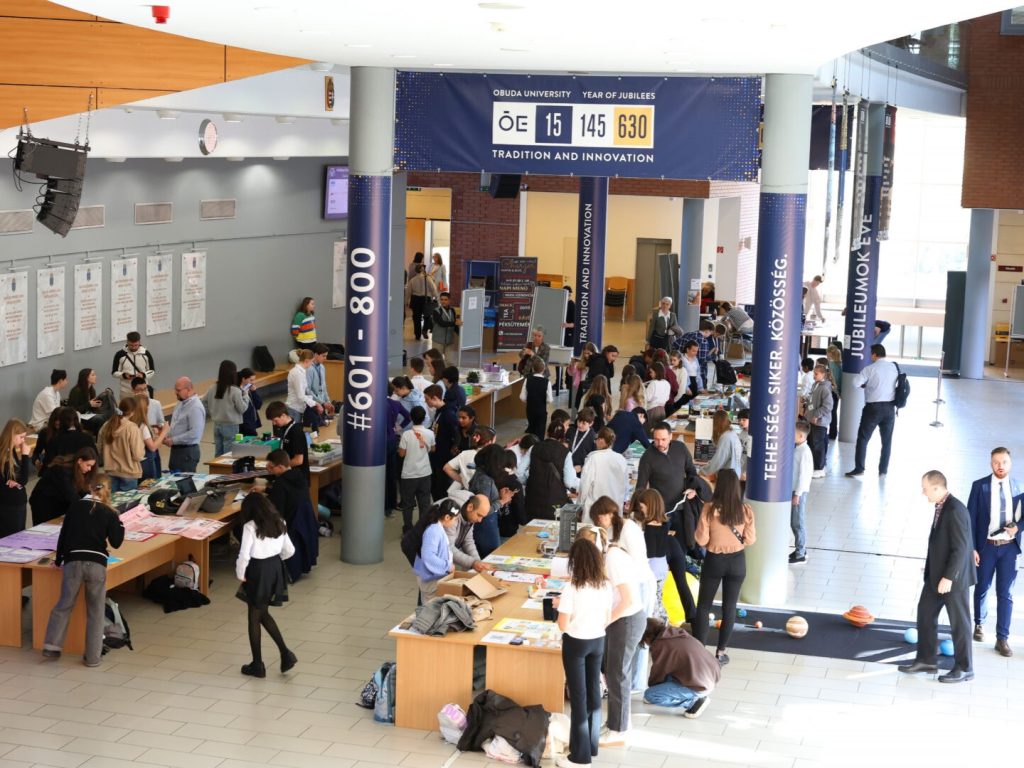We have created a vibrant innovation ecosystem where we collaboratively shape our programs with the involvement of the business sector and the scientific community,” stated Prof. Dr. Levente Kovács during the anniversary celebration of the founding of Óbuda University on November 23. Dr. Cser-Palkovics András, the President of the Rudolf Kalman Foundation for Óbuda University, praised the achieved results, while László Bódis, Deputy State Secretary for Innovation, emphasized the importance of innovation developments. Prof. Dr. Albert-László Barabás, a network researcher, and Prof. Dr. Palkovics László, the Chairman of the Board of Trustees for the Széchenyi István University Foundation, were honored with honorary doctorates by the university.
“The principles of the quintriple helix, collaboration between scientific achievements, industry, government, civil society, and more narrowly, within our own university community, become a reality for us,” emphasized Prof. Dr. Levente Kovács.
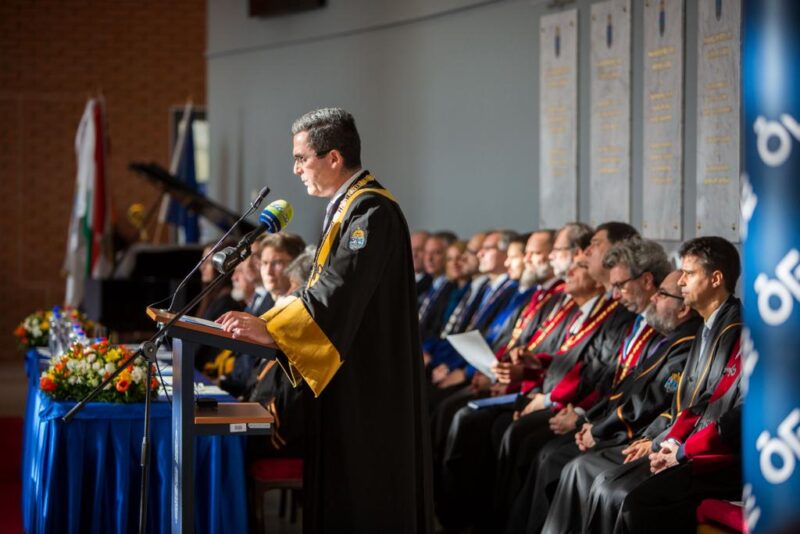
He added, “We have implemented a vibrant ecosystem where, with the involvement of the business sector and the scientific community, we collectively shape our programs. Incentivizing our researchers to exploit intellectual property is a focus in the field of innovation at our university.” Among the achievements, he highlighted, “We are building a globally rare example of an investor-friendly university mindset. We have established our venture capital to promote innovation management. The Óbuda University Venture Capital, Obuda Uni Venture Capital, has been formed. As part of the doctoral training, we are linking the traditional doctoral program to business implementation. The newly established Innovation Management Doctoral School also signals our shift in perspective. We aim to create a culture of innovation-driven society in our country.”
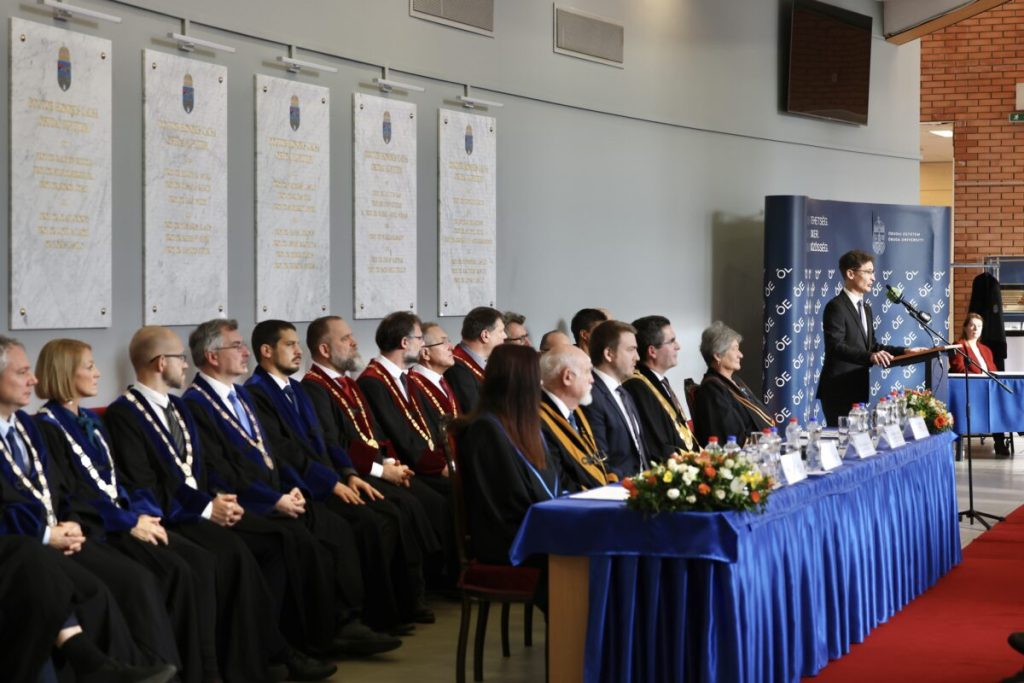
Dr. András Cser-Palkovics highlighted the achievements of the university and the collaborative efforts of its faculty and researchers under the leadership of Prof. Dr. Kovács Levente. “Stability is needed for work, and the rector’s role is a guarantee for that. The foundation provides all possible support within its means for achieving the goals, appreciating the faculty and researchers, and motivating the students.” He emphasized that they consider the university’s autonomy as a key issue.

László Bódis, in his commendation at Óbuda University, emphasized that the institution aligns its plans with the government’s innovation strategy. This alignment aims for a more robust collaboration between higher education, the corporate sector, and research institutes, which is essential for the successful realization of an innovation ecosystem. The establishment of Science Parks, a commitment of the government, will further contribute to strengthening innovation.
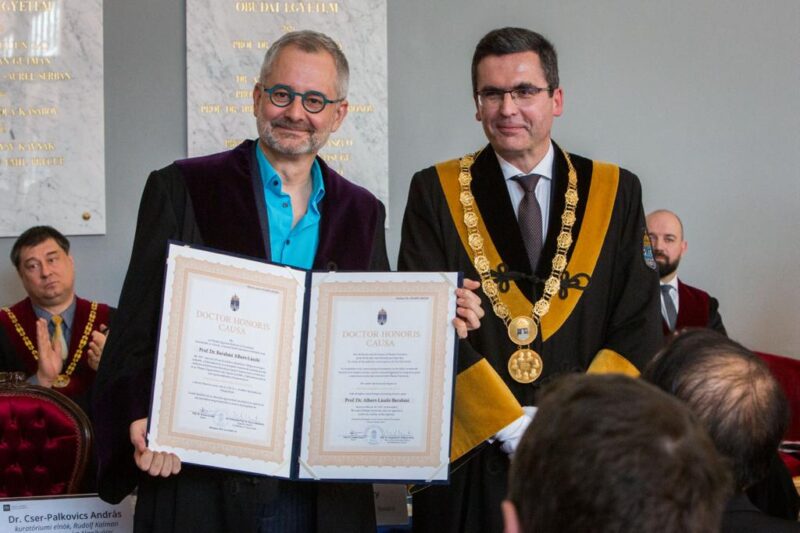
The Senate of Óbuda University conferred the honorary title of Doctor Honoris Causa upon Prof. Dr. Albert-László Barabási. The renowned researcher, a Hungarian physicist and network scientist, is globally recognized for his research and contributions to the field of network science and complex systems. He obtained his scientific degree in 1994 at Boston University, where he became closely associated with the field of network theory during his time at IBM. The internationally acclaimed scientist of Transylvanian origin served as a professor at the University of Notre Dame in Indiana until 2007. Currently, he works in Boston at Northeastern University and Harvard.
Since 2007, Prof. Dr. Albert-László Barabási has been the director of the Center for Complex Network Research at Northeastern University. He has been a member of the American Physical Society since 2003, a member of the Academia Europaea since 2007, and an external member of the Hungarian Academy of Sciences since 2004. According to Google Scholar, his publications have received 274,117 citations, with an h-index of 163.
Prof. Dr. Albert-László Barabási was awarded the honorary title of Doctor Honoris Causa in recognition of his internationally acclaimed scientific achievements in the field of network science and complex systems and his long-standing collaboration with Óbuda University in the field of network research.
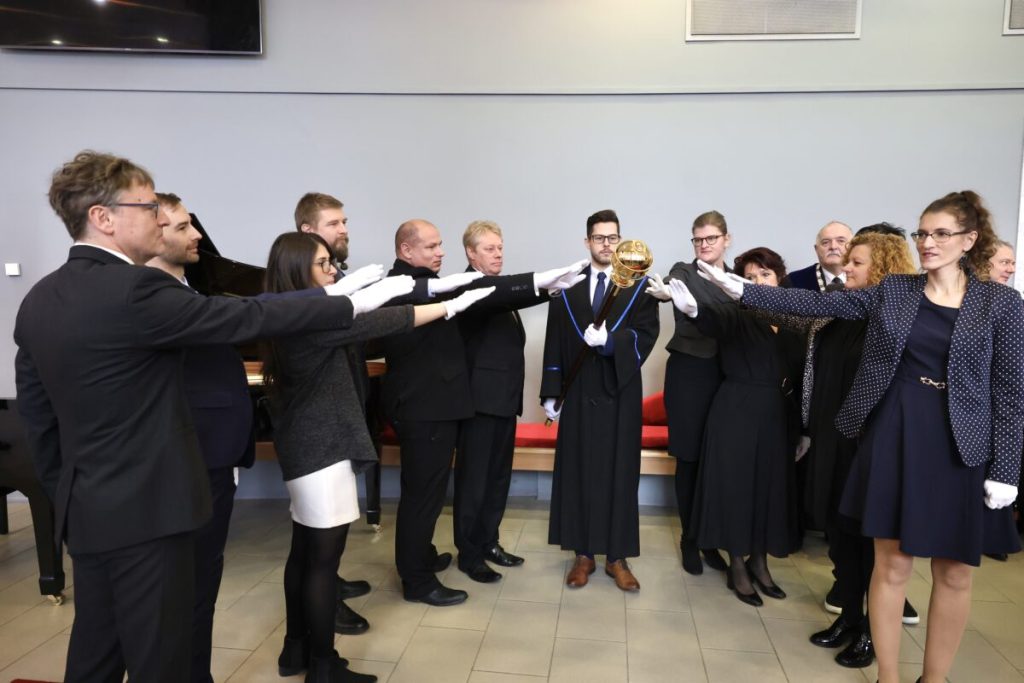
Academic Degrees, Titles
At the ceremonial event, in accordance with tradition, the habilitated and Ph.D. doctors received their scientific degrees, and the Honorary Professor titles were conferred.
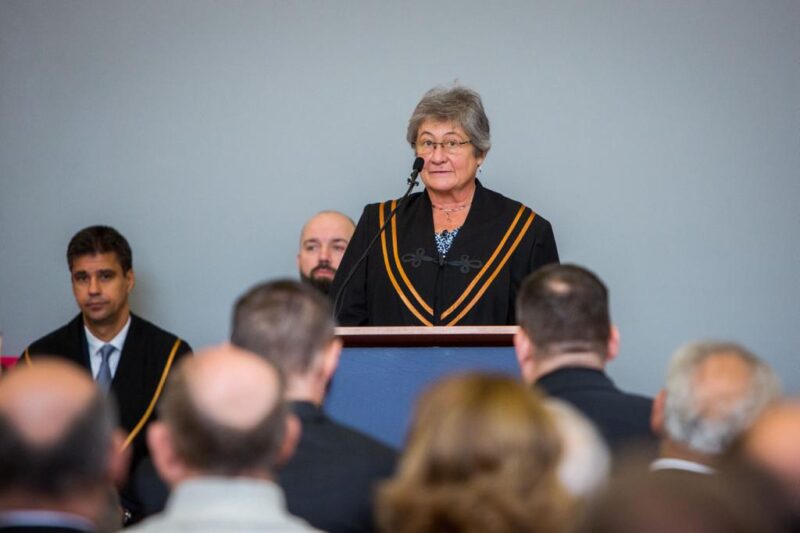
Prof. Dr. Annamária Várkonyiné Kóczy, the president of the University Doctoral and Habilitation Council, introduced the new habilitated doctors of the university during the ceremony: Dr. Rita Dominika Fleiner (Computer Science, Data Modeling Processes in Healthcare IT Applications), Dr. Ildikó Horváth (Computer Science, Cognitive Infocommunications (CogInfoCom)), Dr. Judith Pálfi (Computer Science, Handling Public Utility Network Voltage Retention with Complex IT Models), Dr. István Mező (Mathematics and Computer Science, Generalizations of the Lambert Function), Dr. Tamás Csiszér (Material Sciences and Technologies, Development and Application of Quality Methods in Operational Improvement, Material Science, and Technology Research), Dr. Ágota Horváthné Drégelyi-Kiss (Material Sciences and Technologies, Investigation of Dimensional Metrological Methods).
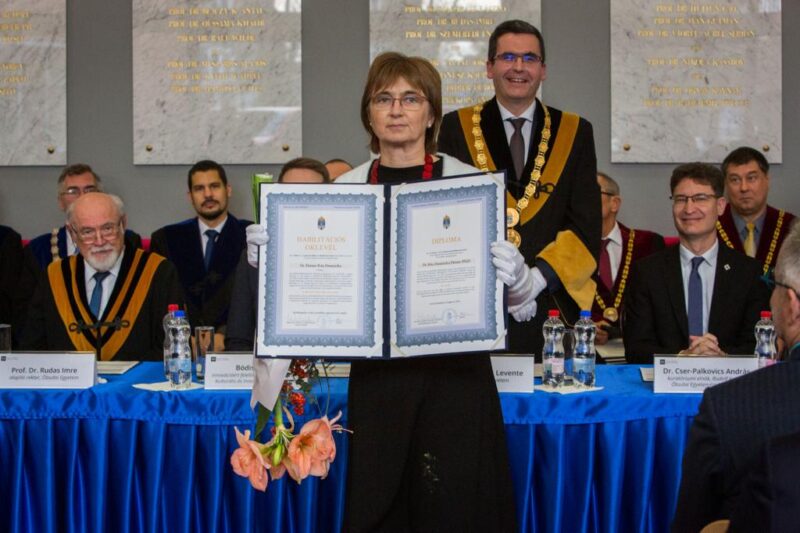
The new PhD graduates, advisors, and titles of doctoral dissertations at the university
Technical Sciences. Field: Computer Science:
Mátyás Szigeti (Supervisor: Dr. Tamás Ferenci, Research Topic: The use of extreme value statistics to develop new metrics for risk assessment in diabetes and trial data analysis)
Péter Szalay (Supervisor: Dr. Kovács Levente Adalbert, Research Topic: Estimation and robust control of a nonlinear diabetes model).
Natural Sciences. Field: Mathematics and Computer Science:
Endre István Börcsök (Supervisor: Dr. Fülöp Kános, Research Topic: Decision support in energy issues with multi-objective optimization).
Scientific Area. Technical Sciences. Field: Material Sciences and Technologies:
Eliza Angeli (Supervisors: Dr. Rozália Szentgyörgyvölgyi and Dr. László Koltai, Research Topic: Solvent retention of cellulose-based packaging materials) Nikolett Andrásiné Hegedüs (Supervisors: Dr. Csaba Balázsi and Dr. Katalin Balázsi, Research Topic: Investigation of silicon and silicon nitride thin films produced by radio frequency spraying) Bálint Varga (Supervisor: Dr. Balázs Mikó, Research Topic: Examination of the micro and macro accuracy of freeform ground surfaces)
Technical Sciences. Field: Military Technical Sciences:
Alexandra Lilla Beregi (Supervisor: Dr. Tibor Babos, Research Topic: Digitization as a new security challenge of the 21st century, with special regard to the cybersecurity of Hungary) Bertalan Beszédes (Supervisor: Dr. György Györök, Research Topic: Architectural possibilities of highly reliable electronic circuits ), Anikó Szabó (Supervisors: Dr. Tamás Berek and Dr. Endre Szűcs, Research Topic: Examination of the training system of security guards performing guard security tasks, development plan in accordance with the changing requirements of the era), Éva Beke (Supervisor: Dr. Gábor Kiss, Research Topic: Employability competencies of engineering students in the mirror of Industry 4.0), Dr. Péter Fábián (Supervisor: Dr. Lajos Berek, Research Topic: Current challenges of the private security sector in relation to global threats) Ferenc Haraszti Supervisor: Dr. Enikő Bitay Research Topic: Investigation of galvanic corrosion of electrical connections with a thermal camera), Csaba Hetyei (Supervisor: Dr. Ferenc Szlivka, Research Topic: Flow modeling and optimization of wind turbines interacting with each other), Ivona Ninkov (Supervisors: Dr. Edit Laufer and Dr. Zoltán Rajnai, Research Topic: Self-Driving Car as a Legally Recognized Cyber-Physical System on Public Roads: Safety and Security Aspects), Gabriella Ráczkevy-Deák (Supervisor: Dr. János Besenyő, Research Topic: Research on hospital security in Hungary and the relationship system of violence against healthcare workers in the light of a sociometric survey), Péter Szuchy (Supervisors: Dr. Cvetityanin Lívia Pintér and Dr. István Bíró, Research Topic: Vibration damping with parallel coupled spring-mass systems) Zsuzsanna Ágnes Nagy-Kovács (Supervisor: Dr. Katalin Takácsné Dr. György Research Topic: Examination of the interrelationships of drinking water supply security in the light of changes in the water quality of the Danube (in the service area of Budapest Waterworks).
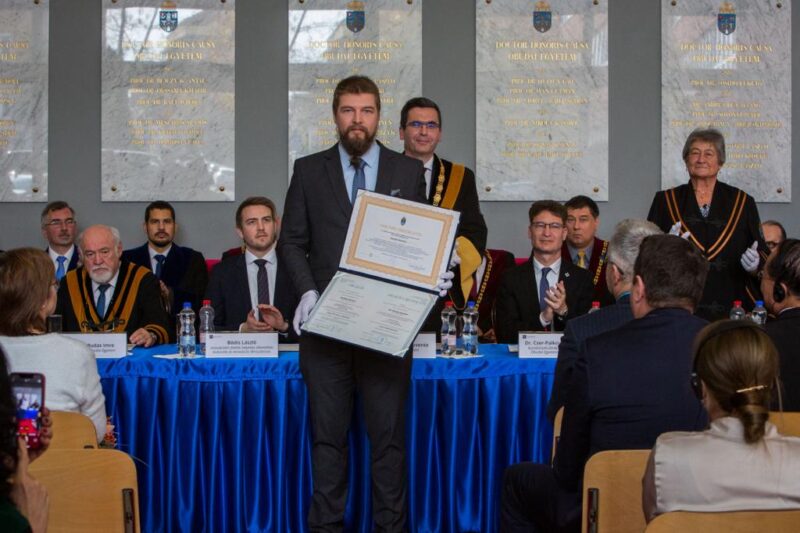
Doctoral (PhD) Degree Recognition:
Natural Sciences. Field: Mathematics and Computer Science:
Béla András Frigyik (Injectivity and stability of generalized X-ray transforms on curves, University of Washington, 2006),
Technical Sciences. Field: Military Technical Sciences:
András Komjáty (Offline programming of industrial robots based on the mathematical model of grinding processes, “Politehnica” Din Timisoara, 2010), Bartos Gaye Ediboglu (Deep Learning Based Offline Handwritten Character Recognizer Systems With a Multilingual Handwritten Character Dataset, Eskisehir Technical University, 2021).
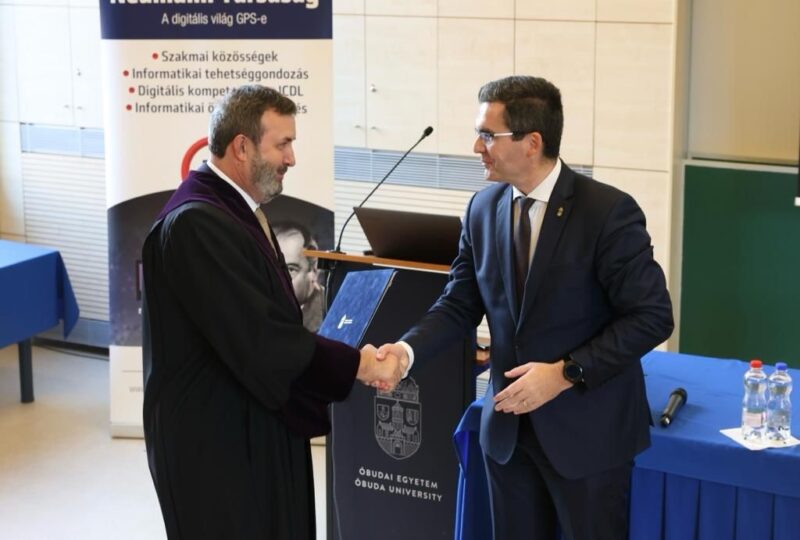
The Senate of Óbuda University awarded the honorary title of Doctor Honoris Causa to Prof. Dr. László Palkovics in recognition of his distinguished and internationally acclaimed scientific work, as well as his contributions to the university. Professor Palkovics assumed his university professorship at Budapest University of Technology and Economics in 2000. Between 1993 and 1994, he served as a researcher at the Canadian Research Council’s Automotive Technology Center. From 1994 onwards, he worked as a scientific researcher at the Institute for Computer Science and Control (SZTAKI) of the Hungarian Academy of Sciences. In 1995, Prof. Palkovics became the Development Director of Electronic Systems at the research and development institute of the Hungarian subsidiary of Knorr-Bremse, a German manufacturer of braking systems. From 2001 to 2003, he served as the Director of European Electronic Development in Germany, and in 2003, he was appointed as the Director of European Research and System Development. He also conducted research as a visiting scholar in Delft and Helsinki. Prof. Dr. László Palkovics held leadership positions, including being elected as a board member of the Association of Mechanical Engineering Sciences and serving as the founding secretary-general of the Hungarian Association of the Automotive Industry in 1996. In 2001, he became the President of the National Technical Development Committee. Following the decision to build the Mercedes-Benz factory in Kecskemét in 2009, he was appointed as the strategic deputy rector of Kecskemét College. In 1998, Prof. Palkovics defended his doctoral dissertation at the Hungarian Academy of Sciences and obtained his doctorate. He earned his habilitation in 2000. In 2007, he was elected as a corresponding member, and in 2013, as a full member of the Technical Sciences Division of the Hungarian Academy of Sciences. The honorary doctorate bestowed upon Prof. Dr. László Palkovics acknowledges his internationally recognized scientific achievements in the dynamics of vehicles and applied control theory, as well as his longstanding collaboration with Óbuda University in the field of intelligent engineering systems.
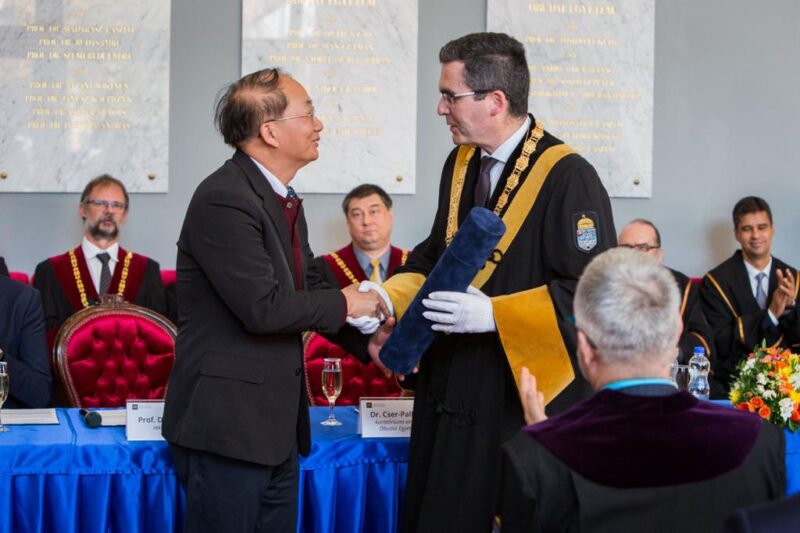
In 2020, the Senate of Óbuda University conferred the title of Honorary Professor to Prof. Dr. Yo-Ping Huang, the Rector of the National Penghu University of Science and Technology in Taiwan. Due to travel restrictions related to the coronavirus, Prof. Huang has not been able to accept the certificate in person. Prof. Huang earned his Ph.D. at Texas Tech University and currently serves as the Rector of the National Penghu University of Science and Technology. His primary research areas include modeling fuzzy systems, deep learning, intelligent control, medical data mining, and rehabilitation systems. He plays a significant role in both international and local branches of the Institute of Electrical and Electronics Engineers (IEEE) and has authored over 300 journal and conference publications. The Honorary Professor title recognizes his long-standing and effective collaboration with Óbuda University.
In addition, the leadership of IEEE Hungary Section and the Senate of Óbuda University bestowed the title of Kalman Rudolf Professor to Prof. Dr. Paolo Fiorini, a professor at the University of Verona. Prof. Fiorini, a professor of computer science and the founder and director of the Altair Lab, is a leading figure in the Hungarian scientific community, internationally recognized for his contributions. His primary research areas include cyber-physical systems, integration of computational methods, control theory, communication systems, applied computation theory, system modeling and control, and human-machine interfaces. Prof. Fiorini has significantly contributed to the development of state-of-the-art methods in space tele-robotics, teleoperated control, autonomous surgical systems, and haptic and safe human-robot interfaces. He was awarded the title of Honorary Professor by Óbuda University in 2016. Prof. Fiorini has published over 400 scientific papers, receiving more than 10,000 independent citations.
Furthermore, the title of Kalman Rudolf Professor was also awarded to Prof. Dr. László Keviczky. Prof. Keviczky is an academician, recipient of the Széchenyi Prize, former Secretary-General, and Vice President of the Hungarian Academy of Sciences (MTA), and former director of the MTA Institute for Computer Science and Control (SZTAKI). He has maintained a relationship with Óbuda University and IEEE Hungary Section for several decades, contributing as an invited speaker at university events, supporting scientific and professional activities. Prof. Keviczky holds numerous prestigious national and international awards, including the Gábor Dénes Award and membership in the Royal Swedish Academy of Engineering Sciences and the Polish Academy of Sciences. He is an IEEE Life Senior Member and has actively participated in the work of the IEEE Control System Society and the Systems, Man, and Cybernetics Society. Prof. Keviczky has been involved in various IEEE transactions and international scientific journals. He has been a keynote speaker at several conferences organized by IEEE Hungary Section, Óbuda University, and its predecessor, Budapest University of Technology.
Lastly, the Senate of Óbuda University honored Prof. Dr. Tingwen Huang with the title of Civis Academicus Honoris Causa – Distinguished Citizen. This recognition is awarded to individuals who have achieved outstanding results through their activities for the university or in cooperation with the university, setting an exemplary and lasting example.
The event featured inaugural lectures by the distinguished recipients of the honorary titles and the Kalman Rudolf Professorships.
Representatives from partner institutions, including Karaganda State Technical University (Kazakhstan), D. Serikbayev East Kazakhstan Technical University (Kazakhstan), L.N. Gumilyov Eurasian National University (Kazakhstan), Tashkent Chemical Institute (Uzbekistan), Sapientia Hungarian University of Transylvania (Romania), Partium Christian University (Romania), Wroclaw University of Science and Technology (Poland), Kosice Technical University (Slovakia), Poznan University of Technology (Poland), Northern University (Croatia), and Subotica Technical College, attended the ceremony. Also present were representatives from Hungarian higher education institutions, rectors, and leaders of supporting municipalities, as well as embassy representatives.
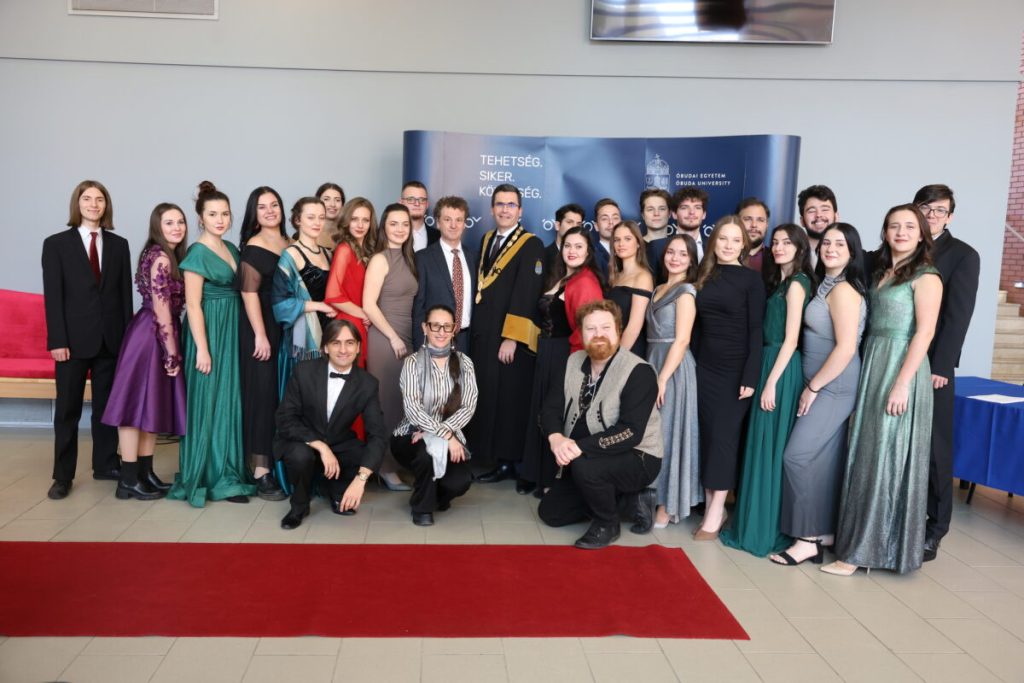
The private singers from Nagyvárad who were invited to the celebratio


